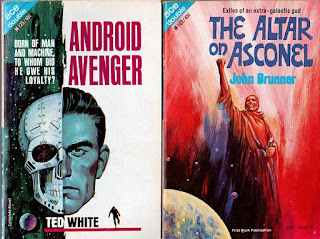Short Story
A long list of candidates:
Octavia Cade, "The Temporary Suicides of Goldfish"
(Kaleidotrope, Winter/18)
Siobhan Carroll, “The War of Light and Shadow, in Five
Dishes”, (Beneath Ceaseless Skies, 3/15/18)
Adam-Troy Castro, "The Unnecessary Parts of the Story"
(Analog, 9-10/18)
Phenderson Djèlí Clark, "The Secret Lives
of the Nine Negro Teeth of George Washington" (Fireside, 2/18)
Beth Goder, "How to Identify an Alien Shark" (Fireside Quarterly, 7/18)
Alix E. Harrow, " A Witch’s Guide to Escape: A
Practical Compendium of Portal Fantasies" (Apex, 2/17)
Kathleen Jennings, "The Heart of Owl Abbas" (Tor.com, 4/11/18)
Rahul Kanakia, “Weft”, (Beneath
Ceaseless Skies, 4/12/18)
Rich Larson, "Carouseling" (Clarkesworld, 4/18)
Rich Larson, “Meat and Salt and Sparks”, (Tor.com, 6/6/18)
Ursula K. Le Guin, "Firelight”, (Paris Review, 9/28/17)
P. H. Lee, "A House by the Sea", (Uncanny, 9-10/18)
P. H. Lee, "A House by the Sea", (Uncanny, 9-10/18)
Yoon Ha Lee, "The Starship and the Temple Cat”, (Beneath Ceaseless Skies, 2/1/18)
Marissa Lingen, "Finding Their Footing”, (Analog, 5-6/18)
S. Quioyi Lu, “Mother Tongues”, (Asimov’s, 1-2/18)
Arkady Martine, “The Hydraulic Emperor”, (Uncanny, 1-2/18)
Heather Morris, “A Slip in the Slice”, (Kaleidotrope, Winter/18)
Mari Ness, “The Ceremony”, (Fireside Quarterly, 7/18)
Annalee Newitz, “The Blue Fairy’s Manifesto”, (Robots vs. Fairies)
Paul Park, “Creative Nonfiction”, (Asimov’s, 5-6/18)
Sarah Pinsker, "The Court Magician" (Lightspeed, 1/18)
Josh Pearce, “Such Were the Faces of the Living Creatures”, (Beneath Ceaseless Skies, 2/15/18)
Hannu Rajaniemi, “A Portrait of Salai”, (Infinity’s End)
Robert Reed, “Love Songs for the Very Awful”, (Asimov’s, 3-4/18)
Alexandra Renwick, "Because Reasons" (Asimov’s, 3-4/18)
Ryan Row, "Superbright" (Interzone, 7-8/18)
Lavie Tidhar, “The Buried Giant” (Robots vs. Fairies)
Cadwell Turnbull, "Jump" (Lightspeed, 9/18)
Peter Watts, “Kindred” (Infinity’s
End)
Rick Wilber, "Today is Today" (Stonecoast Review, Summer/18)
S. Woodson, “Lime and the one Human” (Lady Churchill’s Rosebud Wristlet, 7/18)
As ever, a lot of good choices. Here’s the set from which I’ll
choose my nominees:
Octavia Cade, "The Temporary Suicides of Goldfish"
(Kaleidotrope, Winter/18) – About a
shop where you can get turned into a goldfish for a pretty fair price – if you
need to escape the world for a time. And the narrator, having picked the pocket
of the wrong man, does need to get away. The story lets us learn as we go along
the way this magic works, and how and when one becomes human again, and also,
incidentally, reveals a little twist about the relationship of the narrator,
her girlfriend, and the girlfriend’s grandmother.
Alix E. Harrow, " A Witch’s Guide to Escape: A
Practical Compendium of Portal Fantasies" (Apex, 2/17) -- Told by a librarian (“There have only ever been two
kinds of librarians in the history of the world: the prudish, bitter ones with
lipstick running into the cracks around their lips who believe the books are
their personal property and patrons are dangerous delinquents come to steal
them; and witches” – no prizes for guessing which category our narrator fits),
as she encounters a teenaged boy who becomes obsessed with a particular pretty
bad fantasy novel – perhaps because he needs escape – any escape. Witches know
ways to escape … but that’s against the rules, and librarians are rule
followers. Grounded and quite moving.
Kathleen Jennings, "The Heart of Owl Abbas" (Tor.com, 4/11/18) -- About a songwriter and
a mechanical singer and the Little Emperor in Palace Aster of Owl Abbas. Which
audiences are really most important for the singer? Or for her city, or her
muse? It’s a lovely bittersweet story, and beautifully written.
Rich Larson, "Carouseling" (Clarkesworld, 4/18) – About an artist and a physicist who, when
they’re apart, use a virtual reality sort of system to interact. Then the
physicist’s current experiment goes disastrously long, and the virtual reality
connection is all the artist has of his lover. Larson handles things beautifully
and steers the story to a proper and touching ending.
Arkady Martine, “The Hydraulic Emperor”, (Uncanny, 1-2/18) – Like several strong
pieces this year, it’s about future art, and (in this case), about art aliens
like -- neat stuff, with nice descriptions of the future art, and well-turned
interactions between its protagonist and a rival.
Hannu Rajaniemi, “A Portrait of Salai”, (Infinity’s End) -- a rather
philosophical piece, set in a much altered far future system where it seems all
of humanity’s Great Projects have failed, and the few who remain (having
resisted the Great Temptation of Upload) fight the anomie of the apparent
realization that there is nothing new under the (damaged) Sun. But perhaps
there can be? That’s the question the story asks. Very cool stuff!
Lavie Tidhar, “The Buried Giant” (Robots vs. Fairies) – a human boy runs away, wanting to become a
“real boy”, i. e., a robot. He has dangerous adventures, meeting for example a
robot cat and a robot fox, and a dead girl and a manshonyagger (I always like
the odd Cordwainer Smith reference!) … It’s lovely and moving and perfectly
framed.
Peter Watts, “Kindred” (Infinity’s
End) – a very philosophical story, and to excellent effect, told as a
monlogue from a far future AI to a reconstructed human from our time (we
recognize him!), wondering why humans war.



